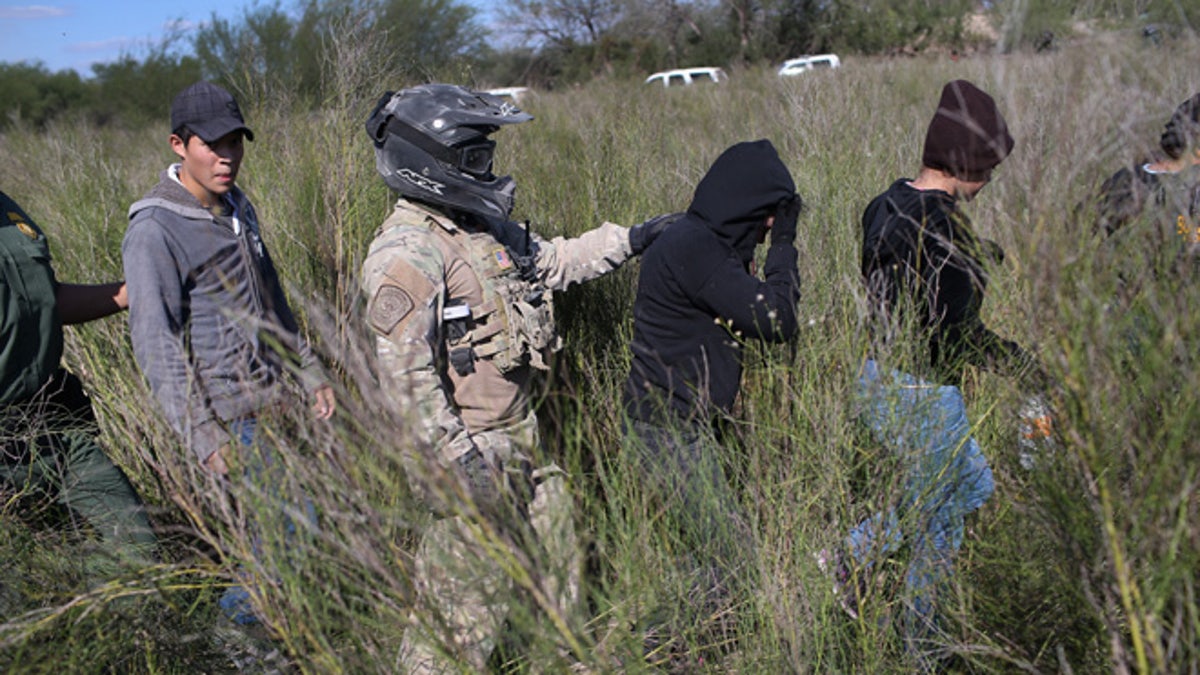
A Border Patrol agent leads undocumented immigrants on December 7, 2015 near Rio Grande City, Texas. (2015 Getty Images)
Carefully worded state laws in Texas could – and might already – aid the state in cracking down on undocumented immigrants without running into problems with the U.S. constitution, a state attorney recently claimed.
Texas Deputy Attorney General Brantley Starr told lawmakers in Austin during a House State Affairs committee hearing on border security and immigration that they may have some more wiggle room when it comes to enforcing immigration laws.
"You do have the ability to create state-level offenses that have an immigration element to them as long as they are sufficiently unique," Starr said, according to the Texas Tribune.
To prove his point, Starr cited House Bill 11, the Legislature's 2015 omnibus border security bill, which was signed by Texas Gov. Greg Abbott in June and made it a state felony to smuggle someone into the country for pay. While the U.S. Supreme Court has ruled that "foreign policy and related matters, such as immigration, are one of the few enumerated powers the federal government has," the Texas attorney believes that the bill could stand up to a court challenge on constitutional grounds if one were brought up.
"There were new state-level elements to that offense [in] that you're taking money in exchange for bringing someone across the border illegally," Starr said. "And the addition of the new state-level elements to that offense made it sufficiently unique."
Starr's comments come as immigration has become a major talking point both on the presidential campaign trail and in the Lone Star state, with GOP lawmakers across the country accusing he Obama administration of failing to secure the U.S. border.
Earlier this week, Texas' Abbott ordered the state's National Guard troops to remain at the Mexico border, extending again a mission that began in 2014 when unaccompanied children started pouring into the country.
Neither Abbott nor the Texas National Guard would say when troops would now go home. Lt. Col. Travis Walters also would not disclose how many troops would remain, but said no new troops would be deployed.
"Texas will not sit idle in the face of this challenge," Abbott said. "We will not be victimized as a state by a federal government's apathetic response to border security."
Texas Department of Public Safety Director Steve McCraw told the committee last week that laws like House Bill 11 were already helping law enforcement in Texas to arrest human smugglers.
"With Border Patrol and the U.S. Attorney's office, it was too low under their threshold," he said. "[The state] can go to the district attorney's office and say, ‘Wait a minute,' and the district attorney took that offense."
Another law that Starr believes Texas could pass without problems from the federal government is one outlawing so-called "sanctuary cities." An important part of the state's sanctuary cities bill would be to make an exception for school districts, as the Supreme Court has already ruled that students cannot be questioned about their immigration status.
Some observers warned the committee that Starr's argument was not as simple or clear-cut as he made it seem.
"This opinion does not foreclose other pre-emption and constitutional challenges to the law," said Jacqueline Watson, the president of the American Immigration Lawyers Association's Texas chapter.
The Associated Press contributed to this report.





















